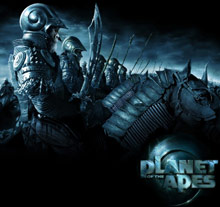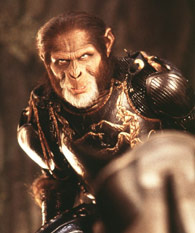| Planet of the Apes |
| |
 |
USA, 2001. Rated PG-13. 120 minutes.
Cast: Mark Wahlberg, Helena Bonham
Carter, Tim Roth, Paul Giamatti, Michael Clarke Duncan, Kris Kristofferson,
Estella Warren, Cary-Hiroyuki Tagawa, David Warner, Luke Eberl, Erick
Avari, Evan Dexter Parke, Lisa Marie, Charlton Heston
Writers: William Broyles Jr., Lawrence Konner, Mark Rosenthal,
based on the novel by Pierre Boulle
Music: Danny Elfman
Cinematographer: Philippe Rousselot
Producer: Richard D. Zanuck
Director: Tim Burton
LINKS
|
 he lights
have dimmed and the lengthy parade of advertisements and previews is finally
over. Danny Elfman's score begins, typically gothic and murky, but uncharacteristically
underpinned by complex drum rhythms, suggesting an otherworldly tribal setting.
It accompanies Tim Burton's dark images of forbidding, inhuman swords and helmets
covered with arcane glyphs and runes. You're in Burton's world now, and it's
obvious that this will be a wild ride.
he lights
have dimmed and the lengthy parade of advertisements and previews is finally
over. Danny Elfman's score begins, typically gothic and murky, but uncharacteristically
underpinned by complex drum rhythms, suggesting an otherworldly tribal setting.
It accompanies Tim Burton's dark images of forbidding, inhuman swords and helmets
covered with arcane glyphs and runes. You're in Burton's world now, and it's
obvious that this will be a wild ride.
Turns out, you're wrong. There's no doubt about it--the movie looks and sounds
fantastic. But beyond that, it never delivers on the promise of the ominous
opening titles. Sure, Planet of the Apes is entertaining on a shallow,
summer-movie level. If you can lie back, relax, and let Burton's aggressively
imagined visuals and Elfman's music wash over you without thinking too hard
about what you're watching, you're likely to leave the theater reasonably content.
But if you're a cranky critic who gets irritated by films that fail to live
up to their potential, you'll leave the theater dissatisfied.
After the titles, Burton takes us aboard a space station in the near future,
where Leo Davidson (Mark Wahlberg) trains chimpanzees to fly reconnaissance
space pods. He just LOVES the little rascals! When one of them is lost in a
magnetic storm, he immediately takes off in his own tiny pod, against orders
and all common sense, to attempt a rescue. After jumping through a time vortex,
the pod ends up crash landing on a strange planet ruled by chimps and gorillas
who keep humans as slaves. Oh, the irony!
Excuse me if I'm not impressed. In the original Planet of the Apes,
Colonel George Taylor (Charlton Heston) was a misanthrope who became a deep-space
astronaut to minimize contact with his own race. But he must fight for his entire
race against the apes--despite the fact that his distaste for humanity has some
validity, given that it has blown itself to pieces, as he discovers at the end.
Is humanity even worthy of freedom? The last shot of the original Apes,
with the Statue of Liberty sticking out of the sand on a desolate beach, is
one of the most enduring images of science-fiction cinema. Now that's
irony.
Burton's Apes attempts serious commentary as well, namely, a ham-handed
indictment of slavery and racism. Racism remains entrenched all over the world,
but it's not as if the notion that slavery is wrong is the least bit provocative.
Though an action/adventure film, the original Apes was a biting satire.
Released in 1968, when the Civil Rights movement was in full swing, when the
United States was embroiled in a war in Vietnam and an arms race with the Soviet
Union, and when social unrest had sharply divided American society, the original
Apes was very much a political film, and a product of its era. The original
Apes took on racism, too, but it also attacked establishment complacency
and foresaw a future in which humanity destroys itself.
Thanks to Burton's imagination, the remake features a more richly conceived
ape society. Burton integrates ape behavior with human behavior to create a
more credible ape civilization than the original film, in which the apes possessed
fewer ape-like traits. But fashioning a plausible "ape society" wasn't really
the original film's goal. Its interest was to hold a mirror up to humanity and
reflect our worst traits back at us. The remake doesn't do that, because we
do not recognize as much of ourselves in the ape society and its exaggerated
villains.
Moreover, by moving the story off Earth, Burton has removed the post-apocalyptic
element. By allowing the human slaves to retain their ability to speak (which
they could not do in the original), Burton opted not to create a pure role reversal.
Although the film makes a statement for animal rights, the lack of a pure role
reversal limits the effectiveness of the indictment. The fact that humans can
communicate with the same sophistication as the apes renders the apes' assumption
that humans do not possess consciousness or a soul somewhat incredible and over-the-top.
Finally, by replacing the jaded Colonel Taylor with a doofus who goes charging
into a cosmic magnetic storm in a sardine can, Burton deprives us of a strong
hero. Heston's performance hasn't aged well, primarily because he himself has
become a bit of a joke, but there is no doubt that audiences identified him
with larger-than-life characters. In contrast, Mark Wahlberg is a smaller-than-life
blank space. Who decided this guy was a movie star anyway? He's okay as long
as he's playing dim bulbs or patsies, like in Boogie Nights and The
Yards, but he is most decidedly not a forceful, charismatic lead. He exhibits
all the magnetism of a petrified lump of dinosaur dung. One wonders what any
of the other characters see in him. Of course, his love interest, Deanna, played
with equal vapidity by model Estelle Warren, is even more of a void.
Fortunately, the rest of the acting is superb, and by itself provides a reason
to see Planet of the Apes. To realize his apes, Burton employs six-time
Oscar-winning makeup designer Rick Baker (How the Grinch Stole Christmas,
Men in Black), who should be a shoo-in for a seventh. Even more effective,
he casts first-rate actors to wear that makeup. Tim Roth (Pulp
Fiction) as the wicked General Thade; Helena Bonham Carter (Fight
Club) as human sympathizer Ari; Micheal Clarke Duncan (The
Green Mile) as Thade's lieutenant Attar; the normally villainous Cary-Hiroyuki
Tagawa (Mortal Kombat) as stoic former
general Krull; David Warner (Titanic)
as Senator Sandar; and the ubiquitous Paul Giamatti (Man
on the Moon) as slave-trader Limbo are uniformly outstanding. Their
performances shine through the barrier of the ape suits to make you see each
as an individual. Makeup or no, they are all quite recognizable, particularly
Giamatti and his comic relief. Meanwhile, Carter infuses her character with
an almost sexual attraction to the human hero, a welcome bit of complexity that
was not in the original film. Watch also for a hilarious cameo by Heston
as a human-hating ape, one of several references to the original film.
AboutFilm.Com
The Big Picture
|
| Alison |
-
|
| Carlo |
C
|
| Claudia |
-
|
| Dana |
-
|
| Jeff |
C
|
| ratings explained |
|
Apes' thematic deficiencies would be more forgivable if it had a gripping
story. But it doesn't. As the thematic simplifications (Slavery bad! Freedom
good!) and the removal of the darker aspects of the protagonist's personality
suggest, Planet of the Apes adheres faithfully to the summer-movie formula.
Protagonist is captured by villains, and in captivity, protagonist meets scantily
clad love interest who can't act. Protagonist fights villains against increasingly
overwhelming odds, until protagonist is saved by writers' contrivances at end.
Roll credits.
Although a great visual artist, Tim Burton has never been known for his storytelling
ability. His films, including Edward Scissorhands, Batman, Batman Returns,
and Sleepy Hollow, tend to have plot
holes deeper than the Mariana Trench. One unavoidably concludes that Burton
doesn't give a rat's patootie about plot, beyond its use as a vehicle for his
imagery and style. In the case of Apes, it appears as if Burton was all-too-willing
to accept the studio's formula, as long as he could do what he wanted with sets,
makeup, and costumes. Apes delivers escapist thrills effectively enough, and
the fruits of Burton's imagination are almost always worth seeing on the big
screen, but don't go expecting anything intelligent.
Like the original Apes, Burton goes for a shock at the very end too,
but it's more for laughs than provocative. And it makes almost no logical sense--that
is, unless the logic is, "We want to remake the sequels, too." The success of
the original Planet of the Apes led to four mediocre sequels that strained
logic and, ultimately, endurance. They were not a good idea. It's hard to imagine
they are any better an idea now than they were thirty years ago.
Review
© August 2001 by AboutFilm.Com and the author.
Images © 2001 Fox and its related entities. All Rights Reserved.


